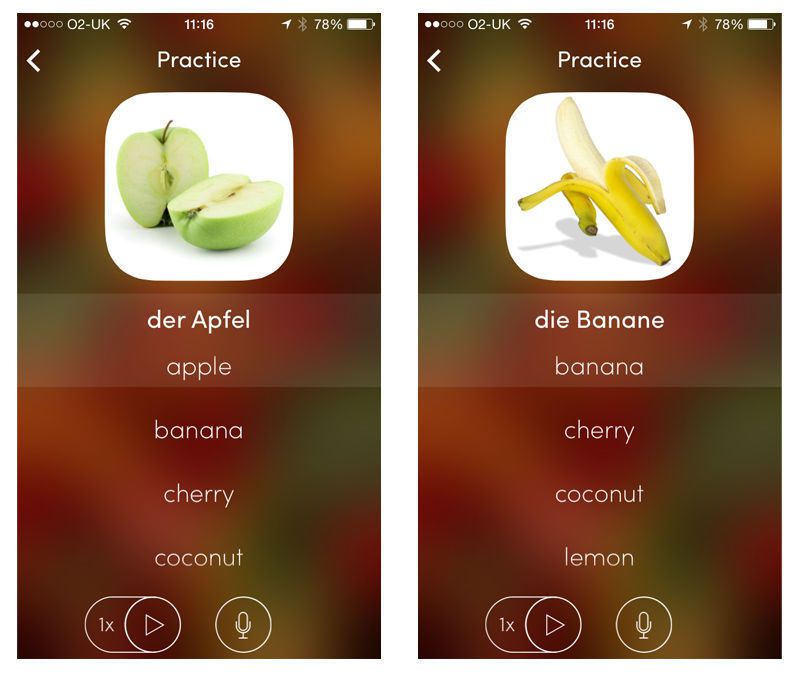Quote of the week: 10 Jan 2015
“No matter what people tell you, words and ideas can change the world.” Robin Williams
For more like this, find us on Pinterest and We Heart It.
Embed This Image On Your Site (copy code below):
6 great language learning blogs to visit in 2015
So how’s everyone’s 2015 going? We hope your year has got off to a great start, and that your new year’s resolutions are all still intact…?
 We’d like to start the year by thanking you all for reading our blog. With a bit of luck, at some point over the last couple of years it’s inspired you, made you smile or just entertained you for a few minutes. We love sharing our thoughts on languages and everything connected to them (sometimes fairly tenuously connected!) so please do keep coming back. Remember, you can subscribe by email to get all our posts delivered straight to your inbox 🙂 And as always, we love hearing from anyone who’d like to be a guest blogger, or with suggestions on topics you’d like to see covered.
We’d like to start the year by thanking you all for reading our blog. With a bit of luck, at some point over the last couple of years it’s inspired you, made you smile or just entertained you for a few minutes. We love sharing our thoughts on languages and everything connected to them (sometimes fairly tenuously connected!) so please do keep coming back. Remember, you can subscribe by email to get all our posts delivered straight to your inbox 🙂 And as always, we love hearing from anyone who’d like to be a guest blogger, or with suggestions on topics you’d like to see covered.
But today we wanted to share with you a few other fantastic language learning blogs that we’ve discovered, which are full of great suggestions, advice and ideas. Please share your own favourites with us in the comments, and we’ll add the best ones to our list!
FlashSticks is a UK-based company with a simple yet ingenious idea – vocabulary flashcards on colour-coded sticky notes. Their Sticky Blog is a treasure trove of fantastic articles written by the FlashSticks team, who clearly know a thing or two about learning languages. They also have a really fun and friendly Twitter account, so they’re well worth a follow there too.
We recommend: 6 tips for getting out of a language learning rut
Lindsay Dow is a language fan who’s also an English tutor. Her blog is a great mix of written articles and videos, and includes learning advice as well as lots about language in popular culture like movies and music. Right now, Lindsay’s running a fantastic photo challenge over on Instagram, which looks like a lot of fun and a great way to learn.
We recommend: 82 British TV shows to help with your English
Sam Gendreau, the polyglot behind this great language site, is passionate about helping other people learn a language. His blog is full of useful and interesting articles, perfect for those with a language addiction or just a passing interest. We challenge anyone to visit Lingholic and not come away feeling inspired and encouraged.
We recommend: Ten amazing reasons why you should learn a foreign language
Ok, so we’re a bit biased because the author of this blog is a former EuroTalker. But that doesn’t change the fact that it’s a great site. As a self-pronounced language geek and freelance translator, she really knows her stuff. Visit the blog for tips and advice for language learners, translators… and anyone interested in how to be British.
We recommend: Don’t be scared… How to get talking in your foreign language
Probably most people already know this blog, as its creator, Benny the Irish Polyglot, is pretty famous these days. Benny is the perfect example of someone who struggled with languages at school but has since fallen in love with them. Since 2003, he’s been travelling the world, learning new languages (in three months) and sharing his experiences and advice.
We recommend: How to make a New Year’s Resolution and actually keep it
Not a language learning blog as such, but so much fun. James is an illustrator from the UK who draws fantastic pictures all based on languages from around the world. His collection includes everything from how to sound like a monkey in different languages to literal translations of the titles of popular TV shows. Be warned though, you may find it hard to drag yourself away.
We recommend: The sounds of the New Year
There are lots more fantastic language blogs out there, so please don’t be offended if we didn’t mention yours this time…
Enjoy!
Learning German: a whole new world
So as you may remember, I recently decided to try and learn some German as part of the uTalk language challenge. It’s not a language I’ve ever studied before, and as much as I’m enjoying getting stuck in, it’s also proving quite a bit trickier than I expected.
First, the accent is quite difficult to master. Up to now, my language studies have focused on the Romance languages, particularly Spanish, with its soft, rolling ‘r’ sound and lovely, lilting quality. German is, in contrast, full of hard ‘d’s and ‘ch’s and is a very throaty language, whereas Spanish trips easily off the tongue. There’s a video that surfaces from time to time on the internet, about how everything sounds angry when you say it in German. I don’t necessarily agree with that, but it’s certainly a very different accent to the languages I’ve studied before and is taking a bit of getting used to. I’m pretty sure I’ve been speaking German with a Spanish accent some of the time, which is confusing to say the least.
Then there are the long words. This is actually one of my favourite things about German – the way you can express almost anything simply by sticking words together – but it’s also quite daunting for a learner. Nowhere is this more evident that in the numbers, which look slightly terrifying on first encounter. That said, the way they’re constructed is actually very logical (67, for instance, is ‘seven and sixty’), so they’re not quite as scary as they look. So far, this is my particular favourite – it looks like a tongue twister but still makes complete sense when you break it down into five and fifty:
Telling the time, on the other hand, is proving a bit of a killer. The main reason for this is that German approaches telling the time differently to English. So whereas here in the UK we say ‘half four’ to mean ‘half past four’, in Germany it means ‘half of the fourth hour‘ – or ‘half past three‘. And it gets better – if you want to say ‘twenty five past three’, it translates in German as ‘five to half four’. I’m sure this is perfectly logical to a German speaker, and I know other languages take the same approach, but it’s taking me a little while to adapt to it.
The other problem I’m having is learning the definite articles with nouns – how do you know when to use ‘der’, ‘die’ or ‘das’? Unlike Spanish, which has rules to help you at least take an educated guess at the article, German feels pretty arbitrary – and it doesn’t help that whereas most languages just have masculine and feminine nouns, German throws in a third one (neuter), just for fun. At the moment I’m just going with what ‘feels right’, with varying levels of success, so I think what I’ll need to do is learn every noun with its article, since there’s no other way of figuring it out. That shouldn’t take long…
I’m jumping in headfirst to the challenge, starting straight away with the games in uTalk to see how much I can work out on my own. Then I’m going back and running through the Practice section for each category to make sure I’ve understood everything correctly, and put meanings to words I may not be sure of. (I suppose it’s the equivalent of attempting a conversation with someone and then going away and looking up anything I didn’t understand in a dictionary.) The results are sometimes a bit messy, but I feel like I’m learning faster that way. I’m working through the categories one at a time, in order, but going back regularly to practise earlier ones and make sure I haven’t forgotten everything I’ve learnt. And I’m saving the Recall sections for later – that will be my final challenge and the ultimate test of how much I can remember!
Since I have a long journey to and from work, I’m making use of my time on the train to learn, and so far it’s not going too badly…
Who else is taking the uTalk challenge? How’s it going? Everyone learns differently, so we’d love to hear how you’re approaching the challenge.
And if you’d like to take part in the challenge, it’s not too late – just drop us an email to get involved!
Liz
Quote of the week: 3 Jan 2015
“Be at war with your vices, at peace with your neighbors, and let every new year find you a better man.” Benjamin Franklin
For more like this, find us on Pinterest and We Heart It.
Embed This Image On Your Site (copy code below):
New Year traditions around the world
Happy New Year! Whether you’re already there, or have a few more hours to wait, we hope that 2015 will be a fantastic year and bring you everything you hope for.
As the celebrations get underway, here are a few interesting New Year traditions from around the world…
Twelve grapes
In Spain, eat a grape for each strike of the clock at midnight; if you manage to eat all twelve during the chimes, you’ll have twelve months of good luck.
First-footing
This is the tradition of being first into a house after midnight, in Scotland and Northern England. The first-foot should bring gifts of a coin, bread, salt, coal, or whisky, which represent financial prosperity, food, flavour, warmth and good cheer. The best kind of first-foot is believed to be a tall, dark-haired man.
Kissing
A tradition from German and English folklore says that you must kiss someone at midnight, and that that person will be significant in your future. If you don’t kiss anyone, it means you’re doomed to a year of loneliness. Apparently.
Yellow underwear
In Chile, if you want good luck and prosperity in the new year, wear yellow underwear – inside out – and then turn it the right way after midnight.
Making a lot of noise
In the Phillippines, the New Year’s custom is to make a lot of noise at midnight, to frighten away evil spirits. People buy small horns called torotots and also use paputok (firecrackers) as well as banging pots and pans and revving their vehicle engines.
Burning ‘Mr Old Year’
In Colombia, the previous year is seen out by families as they build large stuffed male dolls filled with different materials, and items that they no longer want or that have sad memories attached to them. Then they burn the doll at midnight, which represents burning the past and looking to the future.
Lentils
The first thing you should eat after midnight in Hungary is lentil soup, because it’s believed that lentils will bring you riches in the new year – and the more lentils you eat, the richer you’ll be.
New Year Dip
In various towns on the Welsh coast, brave swimmers take a dip in the freezing sea on New Year’s Day. Some people do it in fancy dress – and no, we don’t know why.
How will you be celebrating the New Year? Whatever you’re doing we hope you have a great time!






